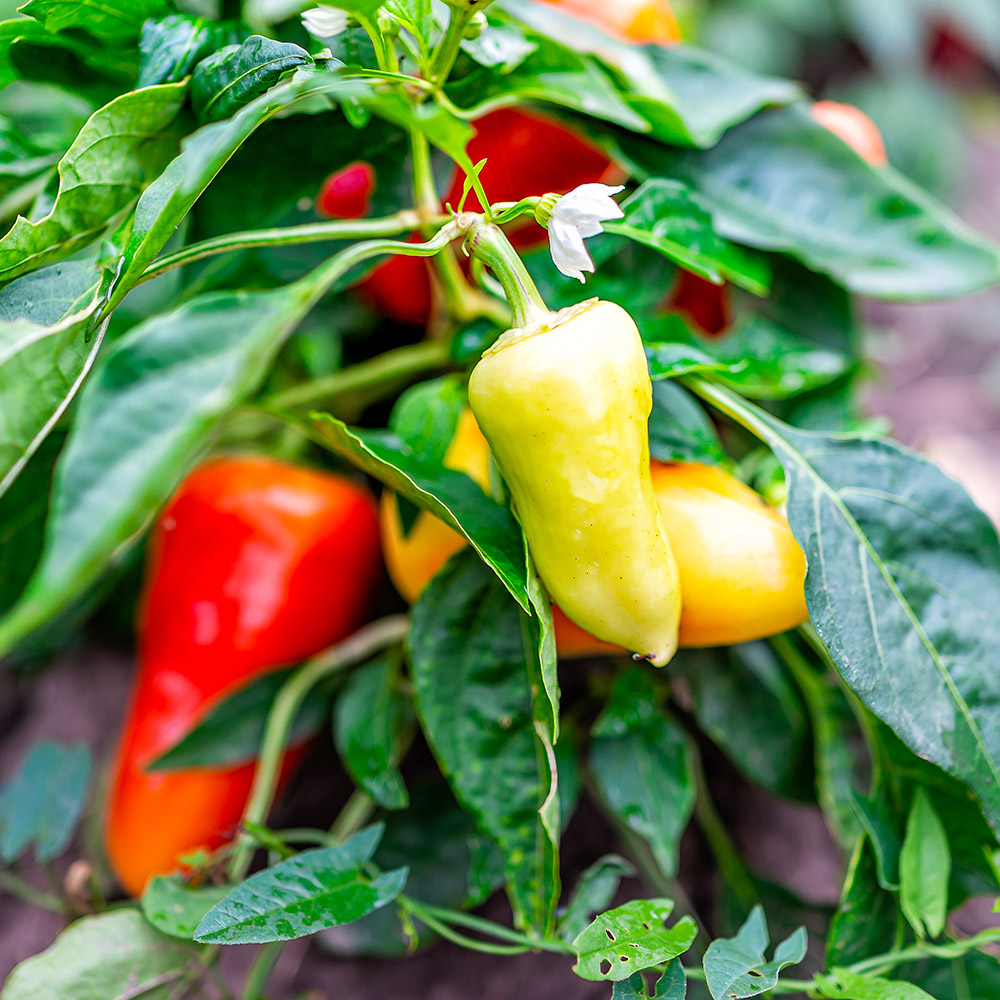Best Fertilizers for Peppers: Boost Growth and Flavor with Our Leading Picks
Best Fertilizers for Peppers: Boost Growth and Flavor with Our Leading Picks
Blog Article
Organic Vs. Synthetic Fertilizers: Which Is Best for Supporting Healthy And Balanced Pepper Plants?
In the realm of supporting healthy and balanced pepper plants, the option in between organic and artificial plant foods stands as a critical decision with significant ramifications. While both options objective to give vital nutrients to sustain plant development, the nuances of their influence on the dirt, plant wellness, and the environment trigger a dispute that echoes throughout the gardening community. Comprehending the distinctive advantages and prospective challenges of each fertilizer kind is essential for pepper farmers looking for to maximize their yields while keeping an eco-conscious and lasting technique.
Advantages of Organic Plant Foods
Organic plant foods provide an environmentally-friendly and sustainable strategy to beneficial pepper plants, giving vital nutrients without making use of artificial chemicals. These natural fertilizers are stemmed from natural resources such as compost, manure, bone meal, and seaweed, promoting dirt health and wellness and biodiversity. Unlike artificial fertilizers, organic options release nutrients slowly, making sure a well balanced and consistent supply for pepper plants to flourish.
One substantial advantage of natural plant foods is their capacity to boost soil structure and water retention. By improving dirt health, natural fertilizers promote valuable microbial activity, which helps in nutrient uptake by pepper plants. Additionally, natural fertilizers minimize the threat of chemical run-off, shielding water sources from contamination and guarding the atmosphere.
Furthermore, natural plant foods add to lasting soil fertility by advertising the growth of valuable dirt organisms. These organisms aid break down natural matter, launching nutrients in a kind that is conveniently accessible to pepper plants. best fertilizers for peppers. By promoting a healthy and balanced soil ecosystem, organic fertilizers sustain sustainable pepper farming practices that benefit both plants and the environment
Drawbacks of Synthetic Fertilizers
Synthetic plant foods, in comparison to their natural equivalents, pose different disadvantages when made use of to nourish pepper plants, impacting both plant health and wellness and ecological sustainability. One major downside of synthetic plant foods is their tendency to leach nutrients from the dirt promptly. This fast leaching can bring about nutrition imbalances in the soil, creating plants to experience deficiencies or poisonings. Furthermore, artificial plant foods can harm helpful dirt microorganisms, such as earthworms and useful germs, disrupting the dirt ecological community's balance.
Additionally, the overuse of artificial fertilizers can contribute to water contamination. Excess fertilizers not soaked up by plants can clean away right into water bodies, resulting in eutrophication, where algae blossoms deplete oxygen degrees in the water, hurting marine life. Synthetic fertilizers are generally acquired from non-renewable resources, such as fossil gas, adding to carbon emissions and environmental destruction during their manufacturing.
Nutrient Absorption Comparison
When contrasting synthetic and natural plant foods in terms of nutrient absorption, natural fertilizers have the benefit of supplying a much more well balanced and slow-release source of nutrients. Organic plant foods contain a range of macro and micronutrients that are not only beneficial for the plants however likewise promote healthy soil microbial activity, which helps in nutrient uptake.
Furthermore, natural plant foods improve dirt structure and water retention capability, allowing pepper plants to gain access to nutrients much more effectively. This enhanced dirt top quality helps with origin advancement, making it possible for better nutrient absorption. Synthetic plant foods, although initially increasing plant growth because of their high nutrient concentrations, may impede long-term nutrient absorption by degrading soil health in time.
Ecological Influence Considerations

On the various other hand, synthetic plant foods, although often more promptly readily available and focused to plants, can have detrimental redirected here effects on the atmosphere if not used appropriately (best fertilizers for peppers). Their manufacturing requires high energy inputs, resulting in greenhouse gas emissions and adding to environment modification. Additionally, the overflow of excess artificial plant foods can contaminate water resources, resulting in eutrophication and harming aquatic environments.
Ideal Plant Food Practices for Peppers
When feeding pepper plants, maximizing nutrient uptake and reducing ecological influence are key considerations. To attain this, it is necessary to follow finest fertilizer practices customized to the certain demands of pepper plants. One essential practice is to carry out a dirt examination prior to applying any fertilizers. This test can identify the pH degree of the soil and identify any kind of nutrient deficiencies, guiding you in picking one of the most suitable plant food formulation.
One more crucial practice is to fertilize pepper plants at the correct time. Typically, peppers gain from receiving plant food at growing and after that once again when they begin to blossom. Over-fertilizing can result in vitamins and mineral discrepancies and harm the plants, so it is vital to comply with advised application prices.
Furthermore, picking a balanced plant food you could look here with an NPK proportion that fits pepper plants' needs is fundamental. Ultimately, incorporating natural and synthetic fertilizers sensibly can aid support healthy pepper plants while decreasing environmental impact.
Verdict

Organic plant foods provide an environmentally-friendly and sustainable technique to beneficial pepper plants, offering essential nutrients without the use of synthetic chemicals. Unlike synthetic plant foods, natural alternatives launch nutrients gradually, ensuring a balanced and consistent supply for pepper plants to prosper.
Artificial fertilizers, in contrast to their natural counterparts, pose different downsides when made use of to nourish pepper plants, affecting both plant health and environmental sustainability. When contrasting artificial and organic fertilizers in terms of nutrient absorption, organic plant foods have the benefit of offering a much more balanced and slow-release resource of nutrients.Furthermore, natural fertilizers enhance soil framework and water retention capability, enabling pepper plants to access nutrients much more successfully.
Report this page